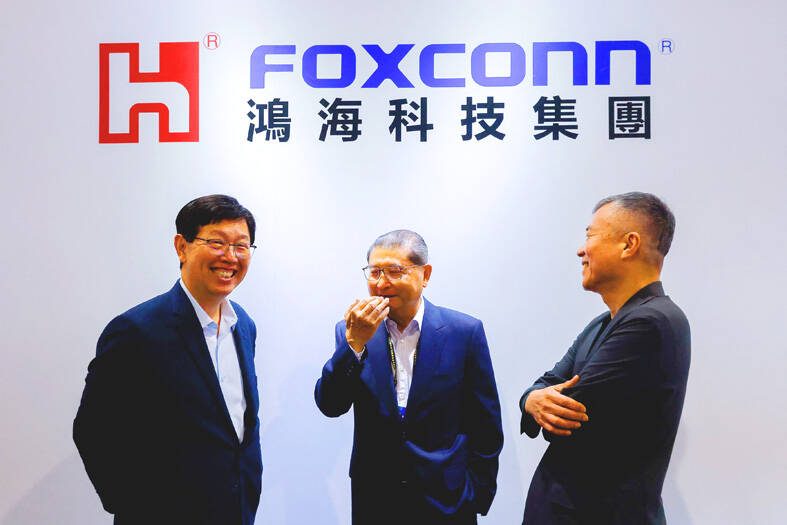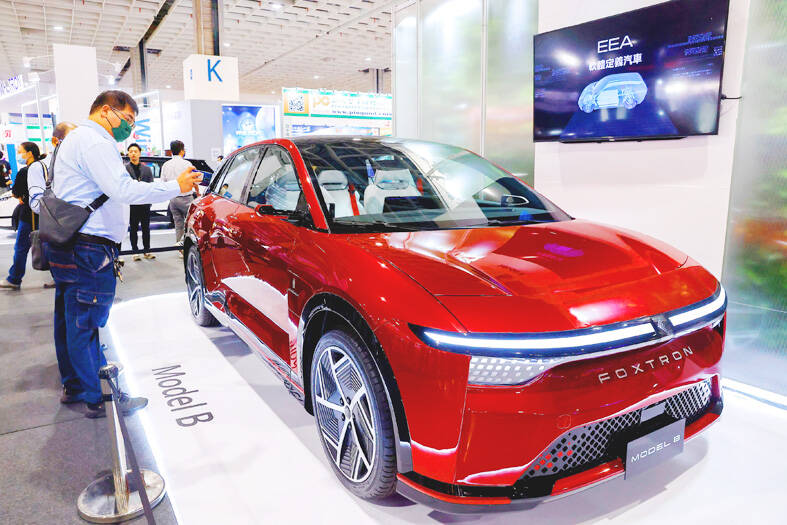The MIH Consortium, an electric vehicle (EV) alliance led by Taiwan-based manufacturing giant Hon Hai Precision Industry Co (鴻海精密), plans to introduce its first commercial electric vehicle prototype in October, it said on Wednesday.
Work on the A-segment Project X demonstration EV is progressing well, MIH CEO Jack Cheng (鄭顯聰) said in an interview at the Taipei International Automobile Electronics Show.
The three-seat EV is likely to be completed in October and begin mass production in 2025, he said.

Photo: Ann Wang, Reuters
The consortium also plans to unveil concepts for a six-seat version of the vehicle next year and a nine-seater in 2025, Cheng said.
MIH plans to focus the vehicle’s promotion on transportation and logistics companies, he said.
MIH had said earlier that the three-seat Project X vehicle would retail at under US$20,000, while buyers would be able to choose from a wide range of customization options via the MIH “build your own vehicle” model.

Photo: Ann Wang, Reuters
MIH has been working with Hon Hai and Thailand’s PTT PCL to extend the consortium’s supply chain into Thailand, where it plans to set up a technological innovation center, Cheng said.
Created to serve the MIH EV open platform, the MIH consortium became operational in July 2021 as part of Hon Hai’s efforts to enter the EV market and diversify from contract manufacturing into hardware and software capabilities.
The open platform was initiated by Hua-chuang Automobile Information Technical Center Co (華創車電), a subsidiary of Taiwan’s Yulon Motor Co (裕隆), and aims to become what executives called “the Android of the EV industry.”
The MIH alliance has 2,621 members in 69 countries and regions around the world.

In Italy’s storied gold-making hubs, jewelers are reworking their designs to trim gold content as they race to blunt the effect of record prices and appeal to shoppers watching their budgets. Gold prices hit a record high on Thursday, surging near US$5,600 an ounce, more than double a year ago as geopolitical concerns and jitters over trade pushed investors toward the safe-haven asset. The rally is putting undue pressure on small artisans as they face mounting demands from customers, including international brands, to produce cheaper items, from signature pieces to wedding rings, according to interviews with four independent jewelers in Italy’s main

Japanese Prime Minister Sanae Takaichi has talked up the benefits of a weaker yen in a campaign speech, adopting a tone at odds with her finance ministry, which has refused to rule out any options to counter excessive foreign exchange volatility. Takaichi later softened her stance, saying she did not have a preference for the yen’s direction. “People say the weak yen is bad right now, but for export industries, it’s a major opportunity,” Takaichi said on Saturday at a rally for Liberal Democratic Party candidate Daishiro Yamagiwa in Kanagawa Prefecture ahead of a snap election on Sunday. “Whether it’s selling food or

CONCERNS: Tech companies investing in AI businesses that purchase their products have raised questions among investors that they are artificially propping up demand Nvidia Corp chief executive officer Jensen Huang (黃仁勳) on Saturday said that the company would be participating in OpenAI’s latest funding round, describing it as potentially “the largest investment we’ve ever made.” “We will invest a great deal of money,” Huang told reporters while visiting Taipei. “I believe in OpenAI. The work that they do is incredible. They’re one of the most consequential companies of our time.” Huang did not say exactly how much Nvidia might contribute, but described the investment as “huge.” “Let Sam announce how much he’s going to raise — it’s for him to decide,” Huang said, referring to OpenAI

The global server market is expected to grow 12.8 percent annually this year, with artificial intelligence (AI) servers projected to account for 16.5 percent, driven by continued investment in AI infrastructure by major cloud service providers (CSPs), market researcher TrendForce Corp (集邦科技) said yesterday. Global AI server shipments this year are expected to increase 28 percent year-on-year to more than 2.7 million units, driven by sustained demand from CSPs and government sovereign cloud projects, TrendForce analyst Frank Kung (龔明德) told the Taipei Times. Demand for GPU-based AI servers, including Nvidia Corp’s GB and Vera Rubin rack systems, is expected to remain high,